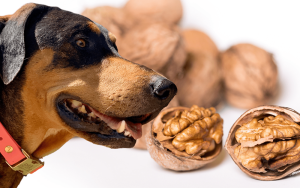Can Dogs Eat Bananas? A Complete Guide to the Benefits, Risks, and How to Safely Serve Bananas to Your Pup

As pet owners, we all want to treat our dogs to tasty snacks, but we often wonder if certain human foods are safe for them. Bananas are a popular, healthy fruit for humans, but can dogs eat bananas too? In this comprehensive guide, we will explore the
nutritional benefits of bananas for dogs, potential risks, and how to safely incorporate them into your pet’s diet. So, if you’re curious about whether bananas are a good treat for your dog, keep reading to find out everything you need to know!
1. Can Dogs Eat Bananas? Yes, But in Moderation
The short answer is yes, dogs can eat bananas. Bananas are not toxic to dogs, and many dogs actually enjoy the taste and texture of this fruit. Packed with essential nutrients like potassium, fiber, and vitamins, bananas can be a healthy treat for your
dog when given in moderation.
However, it’s important to keep a few things in mind when offering bananas to your furry friend. Just like any other treat, bananas should be fed in moderation to avoid overloading your dog with too many calories or nutrients that could upset their digestive
system.
2. The Nutritional Benefits of Bananas for Dogs
Bananas are rich in vitamins and minerals that can be beneficial for your dog’s health. Here’s a breakdown of the key nutrients found in bananas and how they can benefit your dog:
Potassium
Potassium is an essential mineral that helps regulate your dog’s muscle function, nerve function, and overall fluid balance. A lack of potassium can lead to weakness, cramping, and other health issues, so including potassium-rich foods like bananas in
your dog’s diet can contribute to their overall well-being.
Fiber
Bananas are also a good source of dietary fiber, which is essential for maintaining a healthy digestive system. Fiber helps regulate bowel movements, prevent constipation, and support gut health. If your dog suffers from occasional digestive issues, adding
a small amount of banana to their diet might help alleviate symptoms.
Vitamin C
While dogs can produce their own vitamin C, adding foods rich in this vitamin, like bananas, can support their immune system and help combat free radicals. Vitamin C also plays a role in the production of collagen, which is crucial for maintaining healthy
joints, skin, and connective tissues.
Vitamin B6
Vitamin B6, found in bananas, is important for brain function, enzyme activity, and the production of red blood cells. It can also help regulate your dog’s mood and behavior, making bananas a potentially mood-boosting snack for your pup.
Manganese
Manganese is a trace mineral that supports the function of enzymes and contributes to bone health. While your dog’s main source of manganese should come from their regular diet, bananas can offer a small boost in this area.
3. Potential Risks of Feeding Bananas to Dogs
While bananas can offer numerous health benefits for dogs, there are some risks to be aware of. Understanding these risks will help you make an informed decision about whether bananas should be a regular part of your dog’s diet.
1. High Sugar Content
Bananas contain natural sugars like fructose, which can be problematic if your dog consumes too much. Excess sugar can lead to weight gain, obesity, and even diabetes over time. For dogs that are overweight or have pre-existing health conditions, it’s
best to limit their banana intake or avoid it altogether.
2. Digestive Upset
Too many bananas can cause gastrointestinal upset, including diarrhea or constipation, due to the high fiber content. It’s important to monitor your dog’s reaction to bananas and adjust the serving size accordingly.
3. Choking Hazard
Like any other food, bananas can pose a choking hazard, especially for small dogs or those that tend to gulp their food without chewing. To reduce the risk of choking, make sure to cut the banana into small, manageable pieces before serving it to your
dog.
4. Allergic Reactions
While rare, some dogs may be allergic to bananas. Symptoms of a banana allergy may include itching, swelling, or gastrointestinal issues. If you notice any unusual symptoms after feeding your dog bananas, it’s important to consult with a veterinarian.
4. How to Safely Feed Bananas to Your Dog
If you’ve decided to give your dog bananas as a treat, it’s important to do so in a safe and controlled manner. Here are some tips for safely incorporating bananas into your dog’s diet:
1. Serve in Moderation
Bananas should only be given as an occasional treat, not as a daily part of your dog’s diet. A few small pieces of banana once or twice a week should be plenty. The exact amount will depend on your dog’s size and health condition, so it’s always best
to consult with your veterinarian for personalized advice.
2. Peel the Banana
While dogs can eat the flesh of a banana, the peel can be difficult for them to digest and may cause choking or gastrointestinal discomfort. Always peel the banana before offering it to your dog.
3. Cut into Small Pieces
To avoid the risk of choking, cut the banana into small, bite-sized pieces before feeding it to your dog. You can also mash the banana and mix it with your dog’s regular food for added flavor and nutrition.
4. Watch for Signs of Digestive Issues
After giving your dog banana for the first time, monitor their behavior for any signs of digestive upset, such as vomiting, diarrhea, or constipation. If you notice any negative effects, stop feeding them bananas and consult your veterinarian.
5. Use as a Training Reward
Bananas can make an excellent, healthy reward for training. Simply cut the banana into small pieces and use them as treats during training sessions. The natural sweetness of bananas will motivate your dog, and the nutritional benefits make them a guilt-free
option.
5. Creative Ways to Serve Bananas to Your Dog
Bananas are versatile, so you can serve them to your dog in a variety of fun and delicious ways. Here are a few creative ideas:
1. Frozen Banana Treats
On hot days, frozen banana treats can be a great way to cool your dog down. Simply slice the banana into rounds, place the slices on a baking sheet, and freeze them. You can also dip the banana slices in plain yogurt and freeze them for an added treat.
Just be sure to use plain, unsweetened yogurt to avoid added sugars.
2. Banana and Peanut Butter
Dogs love peanut butter, and when paired with banana, it makes a delicious, healthy snack. Spread a small amount of peanut butter on banana slices, and watch your dog enjoy the combination of flavors. Be sure to use unsweetened, xylitol-free peanut butter,
as xylitol is toxic to dogs.
3. Mix with Other Fruits
Bananas can be paired with other dog-friendly fruits like blueberries, strawberries, or apple slices to create a fun, nutritious fruit salad. Just make sure that any additional fruits you include are safe for dogs, and avoid any fruits that are toxic,
such as grapes or raisins.
4. Banana Dog Biscuits
If you’re into homemade dog treats, you can use mashed bananas to make banana-flavored dog biscuits. Combine banana with whole wheat flour, oats, and a little water to create a dough, then bake at a low temperature. These biscuits can be stored in an
airtight container and used as treats.
6. Signs That Bananas Aren’t Right for Your Dog
Although bananas are generally safe for most dogs, there are some signs that may indicate bananas aren’t suitable for your pet:
- Vomiting or Diarrhea: If your dog experiences gastrointestinal issues after eating bananas, they may not be able to tolerate the fruit.
- Lethargy or Changes in Behavior: If your dog becomes unusually tired or seems unwell after eating bananas, it’s a good idea to remove them from their diet.
- Swelling or Itching: Signs of an allergic reaction to bananas can include swelling of the face, mouth, or throat, or excessive itching.
If you notice any of these symptoms, discontinue bananas and consult your veterinarian for advice.
Conclusion: Are Bananas a Good Treat for Your Dog?
Bananas can be a healthy, tasty treat for your dog when fed in moderation. Packed with essential vitamins and minerals, bananas offer numerous health benefits, including improved digestion, better immune function, and enhanced mood. However, like any
treat, bananas should only be given occasionally and in small amounts to avoid potential risks like gastrointestinal upset or excessive sugar intake.
By following the tips and guidelines provided in this article, you can safely introduce bananas into your dog’s diet and enjoy watching them savor this delicious fruit. As always, if you have any concerns or questions about your dog’s diet, it’s best
to consult with your veterinarian for expert advice.






